Search
Remove Ads
Advertisement
Summary 
Loading AI-generated summary based on World History Encyclopedia articles ...
Search Results
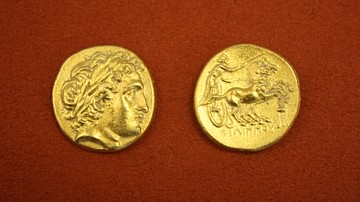
Definition
Numismatics
Numismatics the study of coinage, and is a wonderfully useful tool in the archaeologist's and historian's toolbox. One of the best things for an archaeologist to find while digging is a coin. The reason is simple; it can instantly provide...

Image
When Money Talks: A History of Coins and Numismatics
When Money Talks: A History of Coins and Numismatics by Frank Holt.

Video
When Money Talks: A History of Coins and Numismatics with Frank Holt
When Money Talks: A History of Coins and Numismatics by Frank Holt explores the history of coins from their first invention in ancient Lydia, all the way up to cryptocurrency and the future of coinage. Though coins may seem mundane and the...

Interview
Interview: When Money Talks by Frank Holt
Join World History Encyclopedia as they talk to Frank Holt about his new book When Money Talks: A History of Coins and Numismatics published by Oxford University Press. Kelly (WHE): Thank you so much for joining me today. Do you want to...
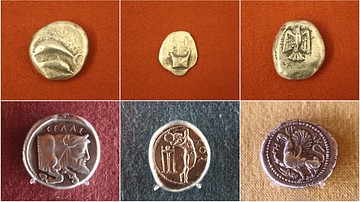
Image
Ancient Greek Coins
Top row (L to R): Thera (c. 500 BCE) - Silver stater, two dolphins. Delos (6th century BCE) - Silver drachm, lyre. Siphnos (540-500 BCE) - Silver stater, eagle. (Alpha Bank Numismatics Museum, Kerkyra, Corfu) Bottom row (L to R...
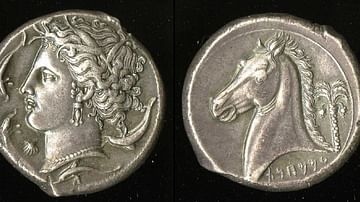
Definition
Carthaginian Coinage
The coinage of Carthage was first minted from the 5th century BCE. Initially adopting the drachma, the Carthaginians later minted silver shekel coins. Designs were instantly recognisable, as intended, and included famous figures such as Hannibal...
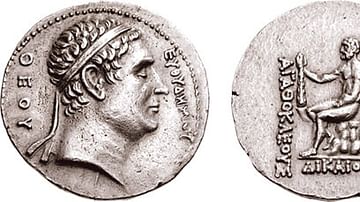
Definition
Coinage
Coins were introduced as a method of payment around the 6th or 5th century BCE. The invention of coins is still shrouded in mystery: According to Herodotus (I, 94), coins were first minted by the Lydians, while Aristotle claims that the first...
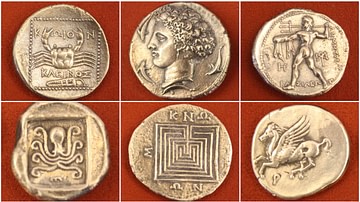
Definition
Ancient Greek Coinage
The coinage of ancient Greece has given us some of the most recognisable images from antiquity as they were stamped with designs to proudly declare the identity of the city which minted them and guarantee their value. One of the great archaeological...

Image
Greek Coins
Top row (L to R): Cos (300-190 BCE) Silver tetradrachm, crab. Syracuse (c. 400 BCE) - Silver decadrachm, head of Arethousa with dolphins. Macedon (306-283 BCE) - Silver tetradrachm, Poseidon with trident. Bottom row (L to R): Euboea...
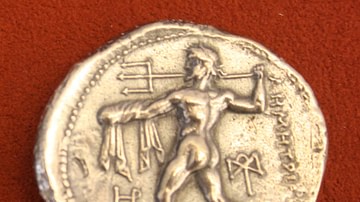
Image
Poseidon, Silver Tetradrachm of Macedon
Silver tetradrachm from Macedon, 306-283 BCE.
Obverse: Nike
Reverse: Poseidon
Alpha Bank Numismatics Museum, Kerkyra, Corfu.